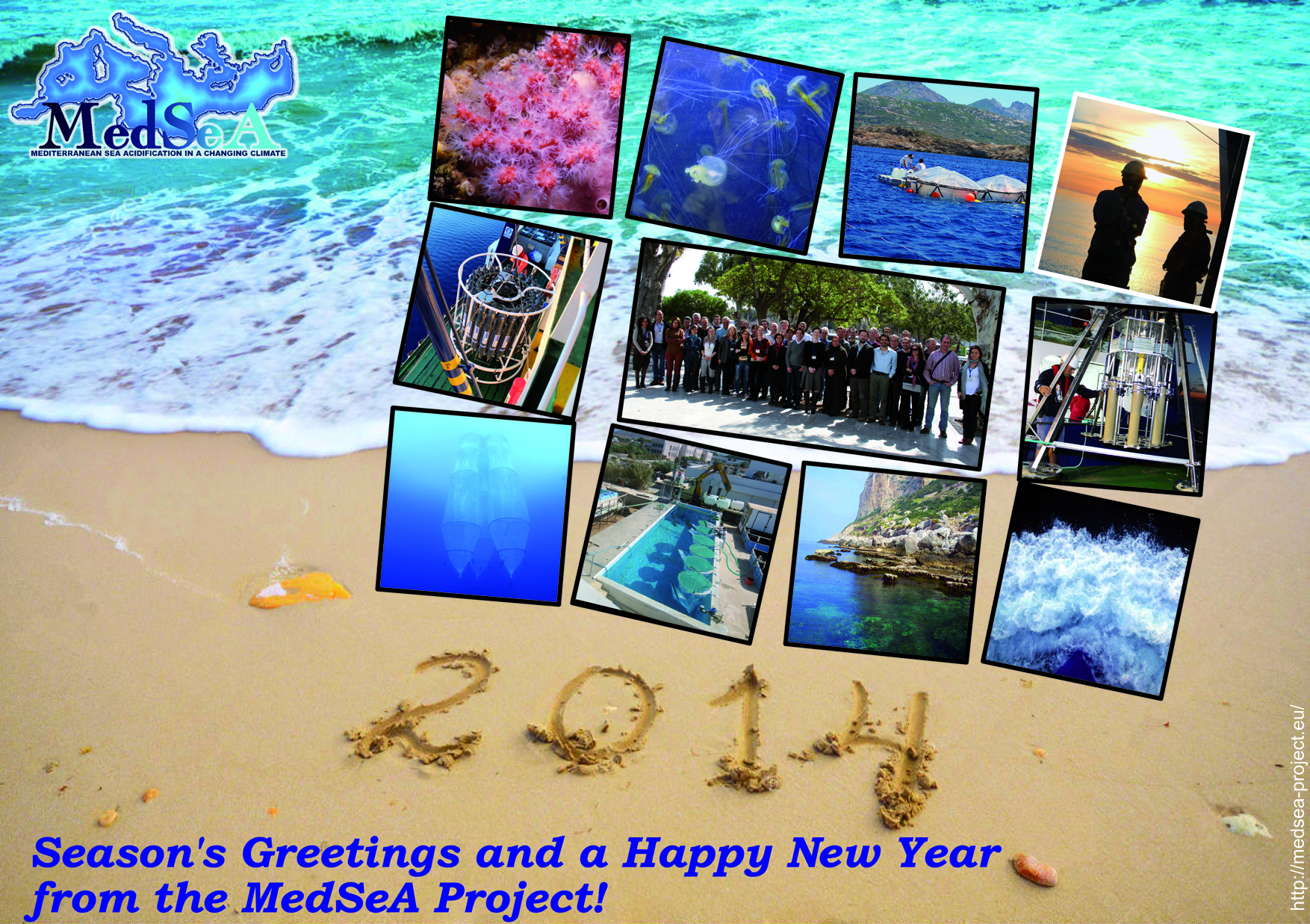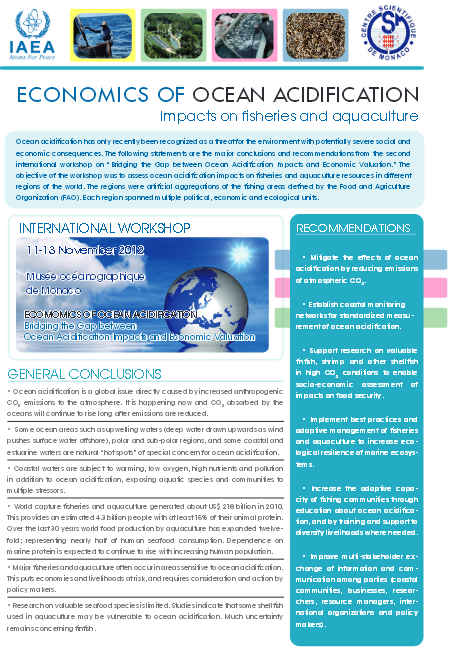Welcome
The European Mediterranean Sea Acidification in a changing climate (MedSeA) initiative was a project funded by the European Commission under Framework Program 7 (2011-2014). It involved 22 institutions (including 6 associated partners) from 12 countries. (more…)
Testing the Waters: the MedSeA video is now online!
The MedSeA Project is happy to announce that its video — Testing the Waters: Acidification in the Mediterranean — is now available on-line. The video, produced by Dutch director Maarten van Rouveroy, shows key information, scientific knowledge, and findings of the MedSeA Project, against the beautiful (and endangered) setting of the Mediterranean waters.
Testing the Waters is the summit of the MedSeA Project’s dissemination efforts to reach the widest audience possible, in order to raise awareness on the constant dangers stemming from ocean acidification and warming. Aquaculture, the tourism and leisure industries, and the whole economy of a large share of Europe’s coastline and population are threatened by these stresses. Spreading as much information as possible, while engaging policy-makers to address this issue and start devising solutions, is one of the key objectives of the MedSeA Project.
Testing the Waters was produced over the course of six months between January and June of 2014. This short documentary film was shot in Spain (Barcelona and Ebro Delta) as well as in Italy (Vulcano – Eolian Islands) with additional material coming from Israel and other places around the Mediterranean. The film was based on interviews with seven people with many others contributing in various capacities. A high-definition version is also available online.
All MedSeA members, partners and friends are warmly invited to share this page online and contribute to the scientific and social outreach of the Project!
Tags:
awareness, climate change, delta del ebro, director, dissemination, ebro, ebro delta, españa, italia, italy, maarten van rouveroy, medsea, ocean acidification, sicily, spain, stresses, testing the waters, video, vulcano, warming, youtube
Final MedSeA Meeting in Barcelona, 10th – 12th June 2014
To discuss and share knowledge about ocean acidification and climate change impacts on the Mediterranean marine environment, over 60 scientists from 10 countries, mainly from the Mediterranean region, met in Barcelona. The meeting was hosted by the Autonomous University of Barcelona, from 10-12 June 2014 for the Final Science Meeting of the MedSeA project.
The first day was dedicated to the report on the main findings on chemical, climatic, ecological, biological and economical changes of the Mediterranean Sea driven by ocean acidification and warming. From these findings an executive summary including main outcomes (10 FACTS on ocean acidification and warming in the Mediterranean Sea; available soon) was created.
The second day was dedicated to the MedSeA dissemination activities, the database and to discuss the knowledge gaps and the possible future activities. The afternoon session was dedicated to the Mediterranean Reference User Group (MRUG) to present the main results and a video about some project activities and to organise the dissemination of results to different stakeholders and decision makers.
Finally a press event was organized on June 12th and hosted by the EC delegation in Barcelona.
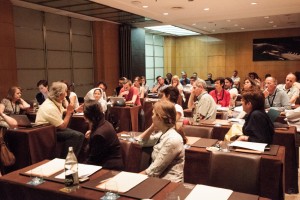
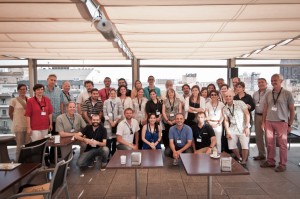
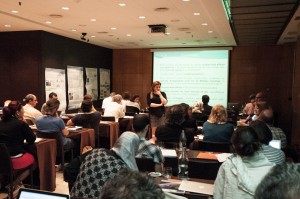
‘Our Ocean’ Conference
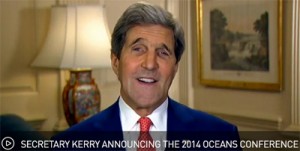 Next week (June 16-17), the U.S. Department of State will host the ‘Our Ocean’ Conference (http://ourocean.info/). The conference will bring together individuals, experts, practitioners, advocates, lawmakers, and the international ocean and foreign policy communities to gather lessons learned, share the best science, offer unique perspectives, and demonstrate effective actions. The conference aims to chart a way forward, working individually and together, to protect Our Ocean.
Next week (June 16-17), the U.S. Department of State will host the ‘Our Ocean’ Conference (http://ourocean.info/). The conference will bring together individuals, experts, practitioners, advocates, lawmakers, and the international ocean and foreign policy communities to gather lessons learned, share the best science, offer unique perspectives, and demonstrate effective actions. The conference aims to chart a way forward, working individually and together, to protect Our Ocean.
In addition to Keynote Addresses, the conference will have a series of panels to discuss:
- Sustainable Fishing
- Marine Pollution (marine debris and nutrients)
- Ocean Acidification
Carol Turley, member of the MedSeA consortium and of the scientific steering committee will contribute to the session on ocean acidification. The conference will be broadcast live on the internet. More details will be available on the conference website http://ourocean.info/ by Monday morning.
The conference also will have a live twitter feed (#ourocean2014) during each of the discussion sessions ? tweets will be shown on the screens and also selecting one or two for the panel moderators to ask the panelists.
HOPE for our seas and ocean
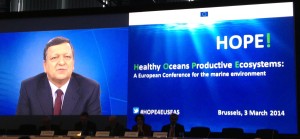 On March 3-4, was held the Healthy Oceans – Productive Ecosystems: a European conference for the marine environment, in Brussels.
On March 3-4, was held the Healthy Oceans – Productive Ecosystems: a European conference for the marine environment, in Brussels.
In 2008, the Marine Strategy Framework Directive (MSFD) was adopted with the aim of protecting and managing our seas and oceans in a sustainable way. The Directive sets an ambitious objective: to achieve and maintain the good environmental status of European seas and oceans by 2020.
The HOPE Conference brought together those working with the European marine environment, providing an opportunity to discuss progress made since the adoption of the MSFD, the problems that still remain and the solutions for improved coherence and better marine governance.
At the close of the Healthy Oceans – Productive Ecosystems (HOPE) conference, the following “Declaration of HOPE” output document was issued. The HOPE conference was opened by Commissioner Potočnik in the presence of 15 EU environment ministers, and over 400 other attendees, including representatives from Member States, the Regional Sea Conventions, academia, industry, NGOs and other stakeholders.
The future of the Mediterranean Marine Ecosystem under discussion in Tunisia
With the kind support and hosting of the Government of Tunisia, the Steering Committee of the MedPartnership project is holding its fourth meeting from 17 to 20 February 2014. The meeting aims to present and discuss the results of the implementation of the MedPartnership activities in 2012-2013, and define future strategies for the project. It also aims to discuss the progress made in the new sister project “Integration of climatic variability and change into national strategies to implement the ICZM Protocol in the Mediterranean”. (more…)
A MOOC (Not a Moose) Is Coming on January 27,2014!
We are very pleased to announce the
World Bank’s first Massive Open Online Course (MOOC) on climate change, which will be launched next month on January 27, 2014. This course presents recent scientific evidence as well as some of the opportunities for urgent action on climate change. It also covers the latest knowledge and information based oncutting-edge research. It includes a session on ocean acidification by Carol Turley (PML).
It is being offered in two tracks: (1) General Public; and (2) Policy Makers and Practitioners. The course runs for 4 weeks, and is free of charge. You have access to the material for approximately 6 months after the course ends.
COP19: Side event on ocean acidification
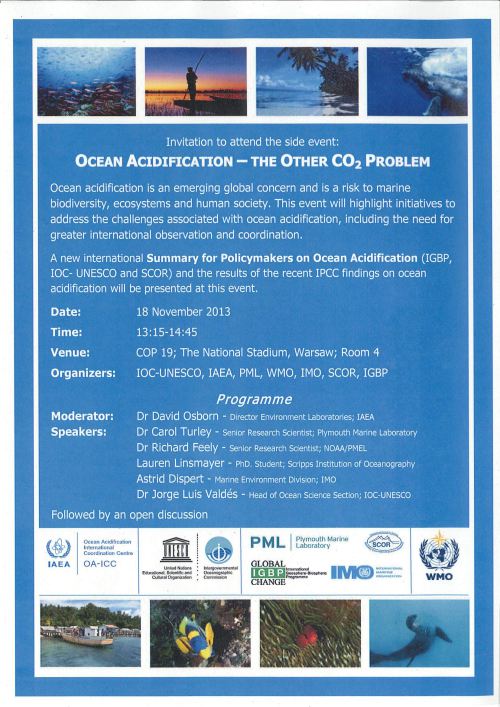 Ocean acidification – the other CO2 problem
Ocean acidification – the other CO2 problem
Ocean acidification is an emerging global concern and is a risk to marine biodiversity, ecosystems and human society. This event will highlight initiatives to address the challenges associated with ocean acidification, including the need for greater international observation and coordination.
A new international Summary for Policymakers on Ocean Acidification (IGBP, IOC-UNESCO and SCOR) and the results of the recent IPCC findings on ocean acidification will be presented at this event.
Monday 18 November 2013, 13:15—14:45
Venue: COP 19; The National Stadium, Warsaw; Room 4
Organizers: IOC-UNESCO, IAEA, PML, WMO, IMO, SCOR, IGBP
Please, find the link to the video presentation of the COP19 side event
here.
Additional information can also be found at the Ocean Scientist for Informed Policy website.








